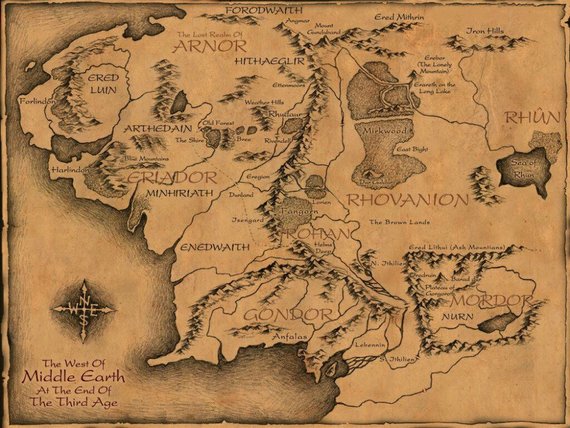Exploring Middle Earth: Why do we love it so much?
 How do you talk about world building and NOT start with Middle Earth?Well, you might be able to, but I cannot. You all know I love Tolkien. But while I could go on and on and on about characters and plot and various other things, today we are going to focus in specifically on Tolkien's World Building.What are some of the things he did?And, interestingly enough, what are some of the things he didn't do?What Tolkien did:Well, to start with, he created a map of the world. And there are even places on this map that don't make it into the books (just talking about The Hobbit and The Lord of the Rings, here for the moment). The fact that there are places on the map OUTSIDE of the story gives the world a larger scope.If we want to look beyond the "storybooks" for a moment, he also created an enormous history for this world and the different races living in it. That history gave him a place to "peek back into" throughout the stories, making The Lord of the Rings, in particular, feel like a realm that has been around for a while, with a real back story that the characters are aware of, much like us in our own world... even if you're not a history buff, you probably know some historical facts and events that occurred throughout history, some in your own country, and some even in other countries, or events that had a more wide-spread scope. Giving Middle Earth a large and involved history helps the characters come alive.
How do you talk about world building and NOT start with Middle Earth?Well, you might be able to, but I cannot. You all know I love Tolkien. But while I could go on and on and on about characters and plot and various other things, today we are going to focus in specifically on Tolkien's World Building.What are some of the things he did?And, interestingly enough, what are some of the things he didn't do?What Tolkien did:Well, to start with, he created a map of the world. And there are even places on this map that don't make it into the books (just talking about The Hobbit and The Lord of the Rings, here for the moment). The fact that there are places on the map OUTSIDE of the story gives the world a larger scope.If we want to look beyond the "storybooks" for a moment, he also created an enormous history for this world and the different races living in it. That history gave him a place to "peek back into" throughout the stories, making The Lord of the Rings, in particular, feel like a realm that has been around for a while, with a real back story that the characters are aware of, much like us in our own world... even if you're not a history buff, you probably know some historical facts and events that occurred throughout history, some in your own country, and some even in other countries, or events that had a more wide-spread scope. Giving Middle Earth a large and involved history helps the characters come alive.
[embedyt] https://www.youtube.com/watch?v=i6LGJ7evrAg[/embedyt]
He created different languages for his races. Of course, he spent a lot of time developing Elvish, but he also created a runic alphabet for the dwarves. (And, technically, he created the languages first and then wrote the world so that he'd have a realistic background for his languages... but I digress). These languages allowed him to name things and places in this world in a consistent manner, so that none of the names jump out at us as "not belonging."  Tolkien also invested time and effort into creating different cultures. The culture of the Shire is very different from that of Laketown, which is different again from Lothlorien, Rohan, or Gondor. And yet, all of the cultures fit well within the scope of this world. They don't feel so different from each other that they belong on completely different planets, or even different continents. They work together and each has things that draw us to them and things that could be improved upon, just like in a real world setting.He placed different creatures in this world. It has dragons, the fell beasts that the ring wraiths ride, wargs, barrow-wights, and oliphants. In terms of sapient creatures, he inserted goblins, orcs, uruk-hai, and ents alongside men, elves, dwarves, hobbits, and wizards. All of these work together to create an intricate network of interesting characters and their interactions in this world.What didn't Tolkien do?Something that Tolkien didn't do, is that he did not create a completely new calendar or clock. (Okay, yes, he DID create a Hobbit Calendar, and you can read all about it HERE, but for all intents and purposes... he tells us that Bilbo and Frodo share a birthday and that it falls on September 22nd... and without reading any further than The Hobbit or The Lord of the Rings, we would be left to surmise that their Sept. 22nd is the same as our Sept. 22nd... and that would be okay). If we look specifically at The Hobbit, we see him talk about "Wednesday" and "autumn" and "winter" and we see the months "May" and "June" mentioned. When Bilbo races out after the dwarves without a pocket handkerchief he tells the dwarves that he didn't get their note until 10:45. So we see a lot of familiar terms and times throughout the story and this actually helps to ground us in the world and gives us something sturdy and familiar to grasp hold of in this new and wondrous place.He also didn't delve too much into how his magic system worked. How Gandalf does the things he does is generally just accepted as "something he can do because: wizard." Elven "magic" is described to Sam thus: it may seem like magic to Sam and the other hobbits, but to the elves, it really isn't magic at all. Not much time is spent defining magic. It's just something that Gandalf can do. We don't know his limits, we don't know why he uses his power sometimes and other times he doesn't, but we generally accept that he knows best, as we only get to see him use that magic in moments when he knows what they are facing is truly beyond the capabilities of his non-wizard companions.
Tolkien also invested time and effort into creating different cultures. The culture of the Shire is very different from that of Laketown, which is different again from Lothlorien, Rohan, or Gondor. And yet, all of the cultures fit well within the scope of this world. They don't feel so different from each other that they belong on completely different planets, or even different continents. They work together and each has things that draw us to them and things that could be improved upon, just like in a real world setting.He placed different creatures in this world. It has dragons, the fell beasts that the ring wraiths ride, wargs, barrow-wights, and oliphants. In terms of sapient creatures, he inserted goblins, orcs, uruk-hai, and ents alongside men, elves, dwarves, hobbits, and wizards. All of these work together to create an intricate network of interesting characters and their interactions in this world.What didn't Tolkien do?Something that Tolkien didn't do, is that he did not create a completely new calendar or clock. (Okay, yes, he DID create a Hobbit Calendar, and you can read all about it HERE, but for all intents and purposes... he tells us that Bilbo and Frodo share a birthday and that it falls on September 22nd... and without reading any further than The Hobbit or The Lord of the Rings, we would be left to surmise that their Sept. 22nd is the same as our Sept. 22nd... and that would be okay). If we look specifically at The Hobbit, we see him talk about "Wednesday" and "autumn" and "winter" and we see the months "May" and "June" mentioned. When Bilbo races out after the dwarves without a pocket handkerchief he tells the dwarves that he didn't get their note until 10:45. So we see a lot of familiar terms and times throughout the story and this actually helps to ground us in the world and gives us something sturdy and familiar to grasp hold of in this new and wondrous place.He also didn't delve too much into how his magic system worked. How Gandalf does the things he does is generally just accepted as "something he can do because: wizard." Elven "magic" is described to Sam thus: it may seem like magic to Sam and the other hobbits, but to the elves, it really isn't magic at all. Not much time is spent defining magic. It's just something that Gandalf can do. We don't know his limits, we don't know why he uses his power sometimes and other times he doesn't, but we generally accept that he knows best, as we only get to see him use that magic in moments when he knows what they are facing is truly beyond the capabilities of his non-wizard companions. Again, we may not be sure why Galadriel can do this. But we accept that she can.
Again, we may not be sure why Galadriel can do this. But we accept that she can.  And as far as I can remember, I don't think Tolkien ever mentions currency. There is the dwarves' treasure, of course, and we know that the mithril shirt is worth a "princely sum" but I don't remember any kind of actual money ever being mentioned. I could be wrong, we're re-reading them with the kids and I'll have to keep an ear out... but if money is mentioned, it's more in a general, "That's expensive," sort of way rather than a, "That'll run you 12 dollars" sort of way.So what do we learn from Tolkien when it comes to world building? Well, personally, I learned that it's okay to focus on just a few things and do them well. I learned that it's okay not to do some things, and that sometimes having a bit of familiarity built into the world can help a reader truly lose themselves in the story.
And as far as I can remember, I don't think Tolkien ever mentions currency. There is the dwarves' treasure, of course, and we know that the mithril shirt is worth a "princely sum" but I don't remember any kind of actual money ever being mentioned. I could be wrong, we're re-reading them with the kids and I'll have to keep an ear out... but if money is mentioned, it's more in a general, "That's expensive," sort of way rather than a, "That'll run you 12 dollars" sort of way.So what do we learn from Tolkien when it comes to world building? Well, personally, I learned that it's okay to focus on just a few things and do them well. I learned that it's okay not to do some things, and that sometimes having a bit of familiarity built into the world can help a reader truly lose themselves in the story. What about you, dear Reader? Have you read The Hobbit or The Lord of the Rings? Did you enjoy your time in Middle Earth? Why or why not? What realms most appeal to you?Make sure to come back tomorrow as we journey over to The Final Empire located on the ruined world of Scadrial. Yep, tomorrow we venture into the world of Mistborn!
What about you, dear Reader? Have you read The Hobbit or The Lord of the Rings? Did you enjoy your time in Middle Earth? Why or why not? What realms most appeal to you?Make sure to come back tomorrow as we journey over to The Final Empire located on the ruined world of Scadrial. Yep, tomorrow we venture into the world of Mistborn!
